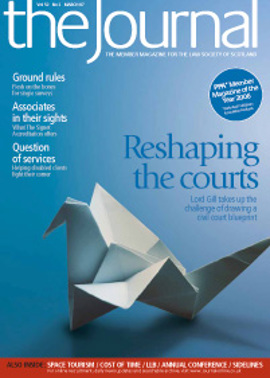Practice? What practice?

There is a tendency among Scots lawyers to lean towards what has been described as “legal nationalism”. This entails principally a pride in the uniqueness and quality of the Scottish legal system and a desire to preserve such uniqueness from being diluted or overwhelmed by outside influences.
Inevitably, the most significant and pervasive influence is the impact of the legal system of England and Wales. In the context of the exercise undertaken by the Law Society of Scotland on the education and training of solicitors in Scotland, however, it would be a mistake to ignore (i) the fact that English law and practice are significant to a large number of Scottish law graduates in their subsequent careers, and (ii) that there may be lessons to be drawn from the experience of the (significantly larger) legal profession south of the border.
Scots lawyers and English law
Any move to teach Scots law in a more practical way would necessarily be an effort to prepare students for the practice of law in Scotland. Practical training in law is not very portable, because practice (especially at junior level) necessarily often bureaucratic processes rather than the application of principles. Unlike the academic study of law, such training is therefore of very little use other than to a student who goes on to practise exclusively within Scotland.
Alastair Bonnington has addressed the issue (Journal, July 2006, 12) of a more vocational LLB degree ignoring the interests of students who do not wish to become lawyers. He reports the Executive’s working group’s finding that 70 to 80% of law students do wish to become lawyers. Harsh as this may seem on the quarter or so of law students who have no interest in such a career, future applicants would know the nature of the course before beginning it. More fundamental issues are that graduates of the LLB in Scotland frequently qualify as lawyers in other jurisdictions, that legal practice in Scotland frequently requires at least some knowledge of English law, and that many Scottish lawyers do not practise in Scotland at all.
According to the 2005 annual report of the Law Society of Scotland, approximately 10% of qualified Scottish solicitors practise outside Scotland, which means that even of the LLB graduates who go on to qualify in Scotland, a significant number would not find that they were better equipped to deal with the practice of law. Taken with the relatively significant proportion of students who study law but intend to pursue other careers, and the number of Scottish LLB graduates who train as lawyers outside Scotland, it seems clear that a large proportion of LLB graduates would gain nothing from a degree more focused on the practice of law in Scotland.
English spoken here
Of those graduates who do qualify and practise as solicitors in Scotland, many would find that the specifically Scottish practical aspects of their education leave them with an incomplete picture of what is required in practice. Lawyers in commercial departments at the larger firms (which employ a high proportion of trainees) will find that in corporate, finance or commercial property practice, clients also expect expertise in English law. This is one of the major reasons why several Scottish firms allow or encourage Scottish trainees to spend part of their training contract in their London offices.
Scotland is not a large market for commercial law firms, and even where clients are not based in England, the practice in certain types of commercial transactions is for the documentation to be governed by English law. A finance lawyer in practice in Edinburgh will most likely never encounter a syndicated loan agreement governed by Scots law. (Any firm advising on English law will employ English qualified solicitors for this reason, but the impracticality of practising in most commercial fields without an understanding of English law remains.)
One year is enough
While the English system has its faults, and should certainly not be followed in Scotland purely for the sake of conformity, the contrast with what is required to qualify as a solicitor in England is illuminating.
There seems to be a degree of concern that becoming a solicitor in Scotland is too easy or requires insufficient legal study or knowledge. When contrasted with the position in England, this concern seems entirely unwarranted. Anyone completing an LLB at a Scottish university and wishing to qualify as a solicitor in Scotland will (in practice) require an honours degree, which takes four years to complete, and the Diploma, meaning they will spend a year longer at university than an individual completing a first degree in law and then qualifying as a solicitor in England. A far higher proportion of solicitors in England have no law degree at all and instead require to sit a one year conversion course. The much smaller number of graduates with non-law degrees who wish to qualify in Scotland require to take a two-year LLB.
Far from qualification as a solicitor being too straightforward, the truth is that the profession in Scotland already has an (arguably over-) extensive list of requirements which anyone who wishes to train as a solicitor must fulfil. As well as the LLB and Diploma, a lengthy list of undergraduate subjects must be passed. The professional competence course (PCC) must then be undertaken by all trainee solicitors (presumably on the basis that professional skills are better learned in a classroom than in professional practice). The requirements for intrants to the Faculty of Advocates are even more onerous.
How practical is practical?
The Diploma is the part of the current legal education programme which is intended to provide students with practical skills before they begin their training contracts, and it would therefore seem fair to assume that making the LLB more practical would most likely entail the degree becoming more like the Diploma. The rationale for this would presumably be that the current LLB does not allow students to acquire a sufficient knowledge of practical subjects. It should therefore go without saying that any proposals to make the LLB more practical are only helpful to the extent that they would give students a body of knowledge that would be useful to them in practice.
Almost every solicitor has a practice which is too narrow for every subject, no matter how practical it is intended to be, to be relevant to it. A student who intends to pursue a career as a corporate lawyer is unlikely to see significant value in learning how to make a better plea in mitigation. The content of the Diploma (and the PCC) already means that anyone intending, for example, to train and subsequently practise as a criminal lawyer is compelled to sit through a large number of subjects which are intended to give them practical knowledge but which will be of no use to them in practice. Extending the period of practical training backwards into the LLB would therefore be likely to mean that students would be forced to undertake more classes in subjects that are irrelevant to their future career.
Firm opinions
The prevailing attitude within law firms offering training contracts is that the undergraduate subjects which applicants for training contracts have studied are not relevant to whether they should be recruited, and that the practical training provided by the Diploma is of sufficiently little importance that they are comfortable recruiting students before they have even begun their Diplomas. I therefore find myself disagreeing with the conclusion reached not only by Mr Bonnington but also by Professor Kenneth Norrie (Journal, September 2006, 10), that “the fundamental problem which exists for the profession is that the law schools’ aims for the LLB degree do not match the needs of the modern legal profession in Scotland”.
In my degree, the classes I studied in my honours year were conveyancing, commercial banking and company law. The conveyancing and commercial banking courses were taught by professors of law who were also partners at commercial law firms. Company law was taught by an academic who was a former solicitor with a “Magic Circle” London firm. It is not accurate to suggest that the universities do not employ academics with experience in practice, or that academics do not teach courses which cover “real” subjects which are useful in practice. It is fair, however, to observe that many students choose not to study subjects at honours level that will be useful to them as practitioners. The law firms to which they apply do not expect or encourage students to take such courses, and there is therefore no incentive in the context of access to the employment market for them to do so.
There is no bias with Scottish law firms toward recruiting students who have studied more black-letter law, even where the curriculum is so open as to allow for applicants to have studied either exclusively practical or commercial classes or exclusively subjects of purely philosophical or sociological interest at honours level. In England, most law firms are ambivalent even as to whether applicants have studied law to honours level or intend only to undertake the one-year conversion course. The admittedly limited number of Scottish firms that employ English law trainees also appear to recruit on the basis of academic calibre rather than practical skills.
The practice of law firms recruiting on the basis of academic calibre can only be adequately explained by recognising that firms expect to give students full training in their practice area, and are therefore more interested in potential than a student’s knowledge of a given area of law at the time they are recruited. That being the case, a move away from the academic study of law in an effort to teach practical subjects is unlikely to benefit the profession. In so far as such a move would lead to the teaching of less academically demanding (and, if the Diploma is any guide, less obviously graded) subjects, this would hinder rather than help firms in their efforts to identify the best candidates.
Martin Forbes is a Scottish solicitor and an associate at Clifford Chance LLP
In this issue
- A look in the mirror
- A welcome review
- Squaring the circle
- Profitability and financial structure
- Access-ability
- Culture change
- Practice? What practice?
- Signet badge takes wing
- Four in one
- Appreciation: Angus McLean
- In on the Acts
- "Lossiemouth, we have a problem"?
- Flagging up VAT
- In the family way
- Practice inside out
- Shape of things to come
- Breaking down a brick wall?
- Playing by the rules
- Scottish Solicitors' Discipline Tribunal
- Website reviews
- Book reviews
- Funny thing
- PIPs' hour approaches
- Enabled in the housing market
- Registers refresher






